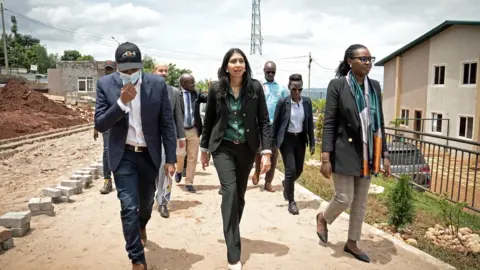Rwanda scheme can save billions of pounds, claims Rishi Sunak
 PA Media
PA MediaGetting the government's Rwanda plan right will "literally save us billions in the long run", Rishi Sunak has said.
He made the claim to journalists on flight to Dubai for the COP28 climate summit, without giving details of where such savings would come from.
He said he was "completely confident" his revised Rwanda plan "complies with our international obligations".
Last month, the UK Supreme Court ruled that the scheme to send some asylum seekers to Rwanda was unlawful.
The prime minister now plans to sign a new treaty with the Rwandan government and to introduce emergency legislation declaring the scheme safe.
Sending asylum seekers who arrive in the UK illegally to Rwanda is a key plank of Mr Sunak's pledge to stop small boat crossings of the English Channel.
But on 15 November, the Supreme Court upheld a Court of Appeal ruling that the policy would leave people sent to Rwanda open to human rights breaches, meaning the scheme could not be implemented in its current form.
Speaking to journalists travelling on his flight to Dubai, Mr Sunak said the next stage would be bringing forward legislation to prove that the central African nation was safe, "thereby making sure there are no more domestic blockers to the proper functioning of this scheme".
"We're finalising that at the moment. And it's important that we get it right because this is such a vital issue.
"But I'm clear about the goal here - the goal is to make sure that Parliament can declare unequivocally that on the basis of everything that we've done that Rwanda is a safe place to operationalise our scheme."
Mr Sunak did not elaborate on how billions of pounds could be saved. And he would not be drawn on how much he was prepared to spend on the scheme.
But he insisted it would have a "crucial" deterrent effect, adding: "If we can get that right, it will literally save us billions in the long run, so that is the right focus."
The government has not provided a total cost for the scheme. But an economic impact assessment prepared for the Illegal Migration Act estimated that removing an individual to a third country, such as Rwanda, would cost £63,000 more than keeping them in the UK.
The UK's asylum system costs £3bn a year. Around £8m a day is spent on hotel accommodation for refugees and asylum seekers.
 PA Media
PA MediaCritics say the daily cost is so high because of the time taken to decide on applications, and a ban on asylum seekers working while they wait for confirmation of their status.
Many Conservative MPs, including former Home Secretary Suella Braverman whom he sacked last month, have urged the prime minister to bring in tough legislation that includes "notwithstanding" clauses preventing judges from applying protections in the Human Rights Act and the European Convention on Human Rights (ECHR) to asylum cases.
Some Tory MPs have called for the UK to withdraw from the ECHR entirely.
But more than 20, including former senior cabinet minister Damian Green, chair of the One Nation group of Conservative MPs, have written to Mr Sunak urging him not to renege on the UK's human rights commitments.
"There are a significant number of Conservative MPs who want to ensure that we defend the rule of law and meet our international commitments," Mr Green told the BBC.
Sir Bob Neill, Tory chair of the Commons justice committee, told the Financial Times: "Many Conservative voters in traditional seats are uneasy with picking fights with the country's institutions and want to keep to the treaties we have entered into."
Government lawyers have warned that instructing the courts to ignore the ECHR risks opening up further avenues for migrants to challenge the legality of deportation flights, on the basis that it would breach Britain's convention obligations.
Asked how far he was prepared to go on the ECHR, the prime minister said: " I've also been clear that I won't allow a foreign court to block us from flights taking off.
"My patience is wearing thin, the country's patience is wearing thin, we have to end this merry go round."
Mr Sunak said "the government and the party is united behind that position but also the country is united on this".
He added that while "great progress" had been made on the small boats issue - "reducing the number of crossings by a third this year, something that everyone thought was impossible when I got this job - we've got more to go.
"I want to finish the job and that's why I'll get the Rwanda scheme up and running."
